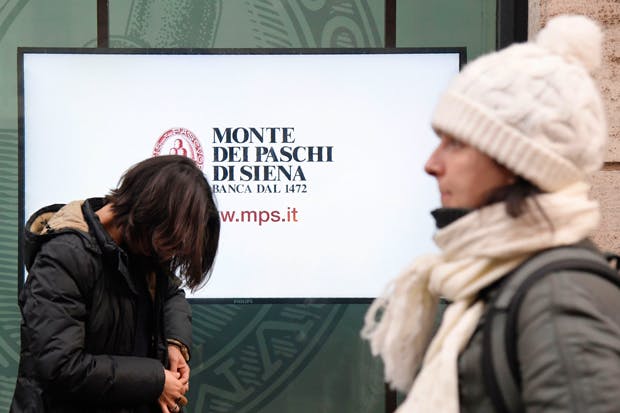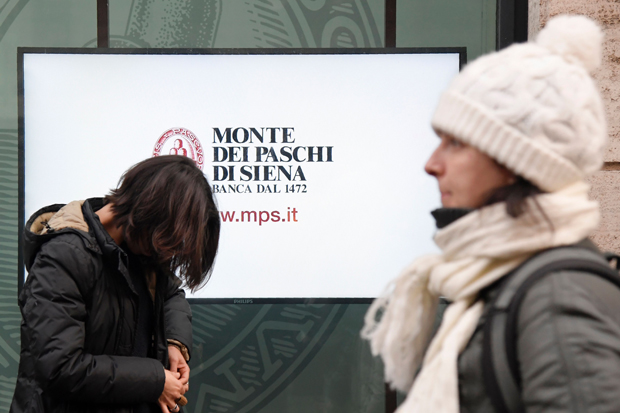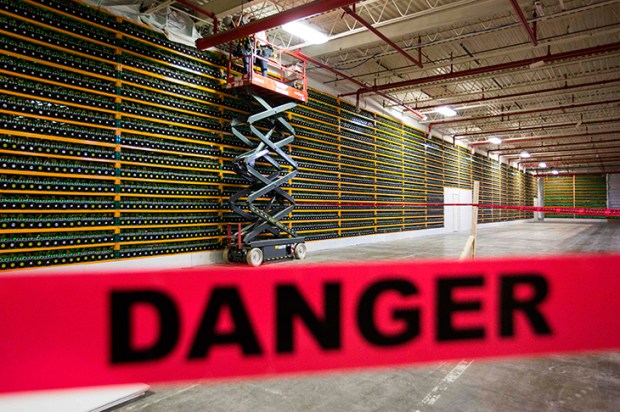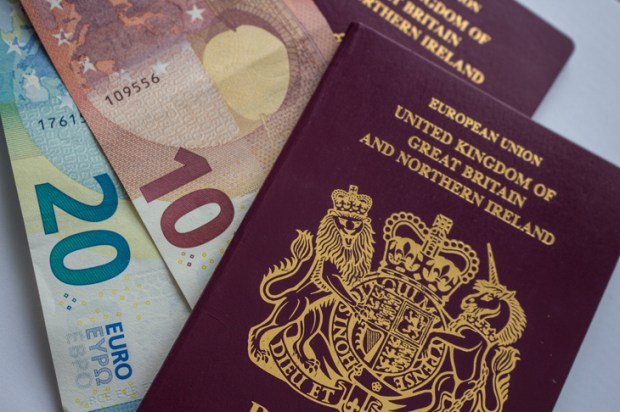The headline business story of the holiday season was the latest bailout of Banca Monte dei Paschi di Siena. This is Italy’s third largest bank and, according to recent ECB ‘stress tests’, Europe’s weakest — regarded by pessimists both as a potential catalyst for systemic collapse and a symptom of deeper Italian problems that could kick off another euro crisis this year.
Monte dei Paschi is also of special interest to me as the world’s oldest bank, having been founded by the magistrates of Siena in 1472 to provide loans at non–usurious rates to ‘poor or miserable or needy persons’, underpinned by wealth from local agriculture. Though it evolved more conventionally over the centuries, it remained sufficiently rooted in its territory and purpose to win praise, in the 1930s, from the exiled American anti-capitalist Ezra Pound — who called it a ‘damn good bank’, in contrast to the Bank of England, which he regarded as ‘a gang of usurers’ under the allegedly evil governorship of Montagu Norman.
Pound was a mad poet, but Monte dei Paschi was undoubtedly a better corporate citizen in his day than it is now. It offers a parable of just about everything banks get wrong by chasing modernity and market share. The Siena institution was divided in 1995 into a bank and a charity which became the bank’s major shareholder: dividends from the bank funded the annual Palio horse race, for example. Then the bank listed on the Italian stock exchange — and, under pressure to demonstrate competitive edge, embraced new products, opened more branches and absorbed other regional banks. When these ventures made losses and bad loans piled up, damage was disguised by off-balance-sheet accounting while successive senior executives first tried to mislead regulators, then left their jobs.
Already bailed out twice, the bank is critically under-capitalised; but having lost most of its stock-market value it can no longer raise new equity in the market. By rights it ought to be wound up or forced into a rescue merger, except that some 40,000 small Italian savers who hold its bonds would be losers if that happened. So the new Italian government has agreed to inject €6.6 billion, while institutional investors take a €2.2 billion ‘haircut’.
European authorities may disapprove (the Germans can be relied upon to object to southern bailouts) but the deal allows Monte dei Paschi to totter on, for now, and to stand as a historic example in the wider ecology of finance — whether it be regional banks, building societies, niche merchant banks or any other specialism you care to name — of entities that would be so much more sustainable and effective if they stuck narrowly to markets they really know best.
Festive surge
The FTSE 100 ended the year strong, at 7142, and reopened even stronger. For 2016 overall the index gained 14 per cent, with multinational mining giants as top performers, while the pound lost 16.5 per cent against the dollar — those facts being closely related, since they mean London blue-chips are still cheaper in dollars than they were 12 months ago. Current optimism rests on the idea of a Trump spending spree on US infrastructure, but such is the perversity of markets that if common City wisdom decides that Brexit will actually boost the UK economy, stocks may fall as the pound resurges and foreign investors take profits.
Meanwhile bitcoin, the mysterious digital currency, also started the year with a surge to a three-year high — but that, I suspect, had more to do with quantities of weed smoked over the holiday.
Portland’s warning
With a pressing need to keep business leaders onside despite failing to offer them Brexit clarity, will Theresa May really follow through on her demands for greater transparency and fairness in executive pay? No surprise if that file stays in the pending tray all year — but a news item that passed most of us by in December may be a harbinger of the way the world is heading. It came from Portland, Oregon, whose city council voted to add a 10 per cent surcharge to local business taxes for any company whose boss is paid more than 100 times the median employee income — and 25 per cent if that ratio (which listed US companies are newly obliged to publish) passes 250 times.
Portland’s move was saluted by no less a left-wing celebrity than Thomas Piketty, the French economist who also advocates global wealth taxes — though his congratulatory email suggested that the 100-times threshold ‘should be substantially lowered’. It would of course be hard to think of a quicker way to drive entrepreneurial high-growth businesses away; prosperity will migrate to places that don’t penalise wealth-creators.
But more and more places may vote to do so unless the wealth-creators themselves find ways to take the heat out of this issue: ‘inequality taxes’ will, I predict, become a big theme of the next decade.
Damp squib?
To south-west France, for a New Year’s Eve soirée that was a glimpse of the Europe we would all have voted for. The host was German, his château was decorated with flags of the many nations represented by his guests, at least four languages flowed round the table, the music was a Django Reinhardt jazz combo from Paris, the wine was excellent and the buffet was groaning. Conversation roamed from Brexit to boar-hunting to the best recipes for foie gras (buy very fresh, marinate in port and brandy, never refrigerate) and inevitably back to Brexit — which provokes a potent mix of envy and irritation in such pan-European company.
The only disappointment was the midnight firework display, which petered out after a few flash-bangs in the fog and no one dared relight it. A metaphor for the doomed European project? Or an omen that 2017 might turn out not so exciting as 2016, but a relatively damp squib?
Got something to add? Join the discussion and comment below.
Get 10 issues for just $10
Subscribe to The Spectator Australia today for the next 10 magazine issues, plus full online access, for just $10.














Comments
Don't miss out
Join the conversation with other Spectator Australia readers. Subscribe to leave a comment.
SUBSCRIBEAlready a subscriber? Log in